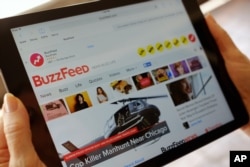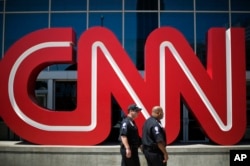The claims were so salacious, they could have appeared in a cheesy, paperback spy novel. Russian intelligence agents were said to have carefully cultivated the next U.S. president for years, and in the process collected information on him that was so damning it could be used for blackmail.
At least that's what the news reports released late Tuesday by CNN and other media outlets alleged. The decision to report the existence of the claims, which were unverified and based on anonymous sources, ignited a fierce debate about journalism ethics and prompted a quick denial from President-elect Donald Trump, who slammed the report as a "political witch hunt."
"I think it's a disgrace," Trump said at a Wednesday news conference. "It's all fake news. It's phony stuff. It didn't happen."
The drama began Tuesday, when CNN first reported that U.S. intelligence chiefs had presented Trump and President Barack Obama with claims that Russian operatives gathered compromising personal and financial information about the president-elect.
The information was presented to Trump and Obama last week during separate briefings on alleged Russian interference in the 2016 elections, according to the unnamed U.S. officials who spoke with CNN. The claims were said to have come from a former British spy.
According to CNN, U.S. intelligence officials had determined the former British operative's past work was credible. But the network stressed that it could not report what information the Russians were said to have collected on Trump, saying the allegations could not be verified.
However, a short time later, BuzzFeed, an online news outlet, published the claims in full, which were included in a 35-page dossier the ex-British spy wrote.
The dossier contained explosive accusations. It said there had been a continuing exchange of information between Trump aides and Russian operatives. It also contained graphic claims of sexual acts between Trump and prostitutes — acts said to have been recorded by the FSB, Russia's main security agency.
Questionable claims
There is a long list of reasons to question the claims found in the dossier — a fact that helps explain why it was published only Tuesday, even though it reportedly had been circulating among journalists and lawmakers for months.
None of the claims has been substantiated. They not only come from an unnamed source (the British ex-spy), the unnamed source himself quotes anonymous sources.
The report also contains several basic mistakes. It misspells the name of a Russian company and incorrectly states that Barvikha, a settlement outside Moscow, is "reserved for the residences of the top leadership and their close associates."
Political motivations also could be at play, as the dossier was said to have been the result of opposition research funded by Trump's election opponents.
Nonetheless, BuzzFeed defended its decision to publish the document. While acknowledging there was "serious reason to doubt the allegations," it said that ultimately U.S. citizens should be able to "make up their own minds about allegations about the president-elect that have circulated at the highest levels of government."
In its own statement, CNN said its decision to go with the story was "vastly different" from BuzzFeed's.
"We are fully confident in our reporting. It represents the core of what the First Amendment protects, informing the people of the inner workings of their government; in this case, briefing materials prepared for President Obama and President-elect Trump," said the CNN statement.
"We made it clear that we were not publishing any of the details of the 35-page document because we have not corroborated the report's allegations," it added.
Valid argument?
But in the opinion of many journalism ethics scholars, that argument doesn't add up.
"They're still reporting on an unsubstantiated claim from what they think is a credible source," said Jeffrey Seglin, an ethics and policy expert at Harvard University's Kennedy School of Government. "To have so many qualifiers in front of your material, it strikes me as problematic."
Seglin questioned whether the desire to be the first media outlet to report the story outweighed journalism ethics considerations. "That does great damage to the media, and it raises suspicions in the minds of the readers and the viewers," he said.
Judith Matloff, who teaches at Columbia University's School of Journalism, said if she were an editor, she would not have published the document if its contents could not be verified.
"I understand why they did what they did, because Trump's the president-elect and there's been a lot of questions about what Trump's relationship is with Russia," she said. "Obviously, people are very interested to get more information on this, but they shouldn't be getting potentially false information."
Others supported the decision to go with the story. Most notably, ProPublica, a nonprofit investigative media outlet, said BuzzFeed was justified in printing the dossier once it became a matter of public discussion.
"Once [the] CNN story [came] out, citizens should have evidence to consider for themselves," ProPublica President Richard Tofel said in a tweet.






